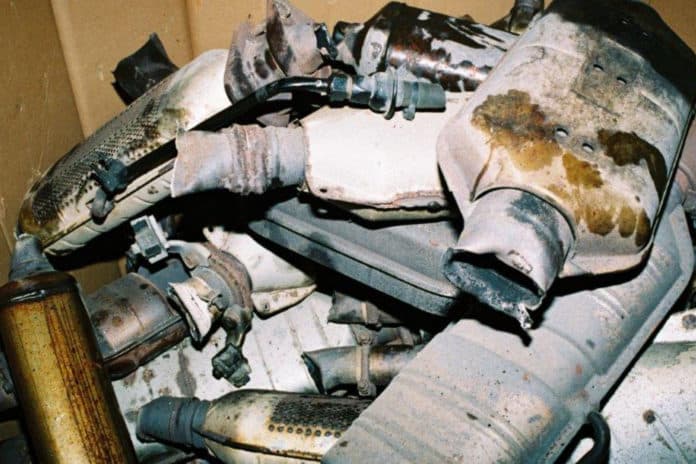The U.S. Department of Justice announced federal charges last week against 21 people connected to a nationwide catalytic converter theft ring, including participants who allegedly sold the precious metal powders they processed to a metal refinery for over $545 million.
In one of two separate indictments, defendants in Oklahoma are accused of receiving catalytic converters stolen by “low-level” intermediate buyers from several states, including Minnesota.
Arrests, searches, and seizures took place in California, Oklahoma, Wyoming, Minnesota, New Jersey, New York, Nevada, North Carolina, and Virginia, according to the DOJ press release. In total, 21 individuals in five states were arrested and/or charged for their roles in the conspiracy. None of the individuals charged appear to be from Minnesota.
In addition to the indictments, over 32 search warrants were executed, and law enforcement seized millions of dollars in assets, including homes, bank accounts, cash, and luxury vehicles. The specific locations of the Minnesota search warrants were not disclosed.
Charges against the defendants include conspiracy to transport stolen catalytic converters, conspiracy to commit money laundering, and other related charges.
The indictment in the California case says brothers Tou Sue Vang, 31, and Andrew Vang, 27, along with Monica Moua, 51, all of Sacramento, Calif., allegedly operated an unlicensed business from their personal residence where they bought stolen catalytic converters from local thieves and shipped them to DG Auto Parts LLC in New Jersey for processing. The Vang family allegedly sold over $38 million in stolen catalytic converters to DG Auto.
Defendants Navin Khanna, 39; Tinu Khanna, 35; Daniel Dolan, 44; Chi Mo, 37; Wright Louis Mosley, 50; and Ishu Lakra, 24, all of New Jersey, operated DG Auto in multiple locations in New Jersey. Charges say they knowingly purchased stolen catalytic converters and, through a “de-canning” process, extracted the precious metal powders from the catalytic core. DG Auto sold the precious metal powders it processed from California and elsewhere to a metal refinery for over $545 million.
The indictment against 13 individuals in the Oklahoma case says the defendants bought stolen catalytic converters from thieves on the street, then re-sold and shipped them to DG Auto in New Jersey for processing. Over the course of the conspiracy, defendant Tyler James Curtis received over $13 million in wired funds from DG Auto for the shipment of catalytic converters and received over $500,000 from Capital Cores for catalytic converters. Defendant Adam G. Sharkey received over $45 million in wired funds from DG Auto. And defendant Martynas Macerauskas received over $6 million in payments from DG Auto for catalytic converters. In all these incidents, most of the catalytic converters sold to DG Auto were stolen, and DG Auto knew or should have known that when they paid for them, charges say.
“This national network of criminals hurt victims across the country,” said FBI Director Christopher Wray. “They made hundreds of millions of dollars in the process — on the backs of thousands of innocent car owners.”
U.S. Attorney Phillip A. Talbert for the Eastern District of California said that “with California’s higher emission standards, our community has become a hot bed for catalytic converter theft.”
Last year, approximately 1,600 catalytic converters were reportedly stolen in California each month, and California accounts for 37% of all catalytic converter theft claims nationwide, Talbert said.
The Minnesota Department of Commerce website lists 15 of the top vehicles targeted for catalytic converter thefts, including several models of Honda, Toyota, Mitsubishi and Hyundai, as well as Ford Econoline vans and F250 pick-ups.
Catalytic converters are a component of a vehicle’s exhaust device, and they use precious metals in their center, or “core,” to help reduce pollutants. They are regularly targeted for theft due to the high value of these metals, including palladium, platinum, and rhodium. Some of these precious metals are more valuable per ounce than gold and their value has been increasing in recent years, the DOJ said. The black-market price for catalytic converters can be above $1,000 each, depending on the type of vehicle and what state it is from, and they can be stolen in less than a minute. Additionally, catalytic converters often lack unique serial numbers or other distinctive identification features which makes them difficult to trace to their lawful owner.
Numerous law enforcement agencies across the country assisted in the investigation, including Homeland Security St. Paul, the Minnesota Commerce Fraud Bureau, police departments from St. Paul, Roseville, Blaine, Plymouth, Bloomington, Eagan, Woodbury, Fridley, Brooklyn Park, Chaska, Coon Rapids and Mendota Heights, as well as sheriffs’ offices in McLeod, Anoka, Carver, and Brown counties.
– – –
Minnesota Crime Watch & Information publishes news, info and commentary about crime, public safety and livability issues in Minneapolis, the Twin Cities and Greater Minnesota.

















